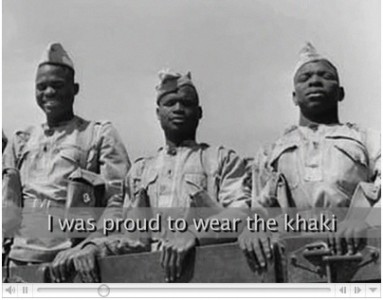As I announced last week, for the next five weeks, I and a team of bloggers, writers, and readers will be discussing the five short stories that have been shortlisted for the "Caine Prize for African Writing" (see those links for more information). I will post and update a list of links to the other bloggers (and a schedule) at the bottom of this post.
The first story is "Bombay's Republic," by the Nigerian writer, poet, and playwright Rotimi Babatunde. You can read it here, in pdf form, courtesy of the Caine Prize committee.
As is the case with so much African fiction, the claims that “Bombay’s Republic” makes about history don’t so much occur in a real historiographic vacuum as they occur in the context of a long history of Africa being read as a historiographic vacuum.
This is a subtle distinction, so let me be more specific: a character in Babatunde‘s story indicates that the Burma campaign, in which African soldiers fought in the British army against the Japanese in WWII, was a “Forgotten War.” But it isn’t, not really; it’s a story that has been told, many times. And each time its told and retold, it’s again flagged as an untold story. Especially in recent years, there’s been a flurry of interest in rediscovering it, from Biyi Bandele’s novel Burma Boys to Barnaby Phillips’ documentary “The Burma Boy,” to yet another documentary (apparently looking for funding), with the novel title “Burma Boys.”
If nothing else, the continuity of titles should tell us something about how well developed this discourse actually turns out to be: each iteration of the story tends back towards the same title because it is somehow understood that this is what you call them, the Burma Boys. At the same time, the marketing copy for each of these re-tellings makes a claim for itself by indicating that the story has never been told before, that it’s a “forgotten war” of the type that a character in Babatunde’s story describes it as. Until now! Rinse and repeat.
The claim I’m going to make for Rotimi Babatunde’s “Bombay’s Republic” is that it not only takes this fact for granted, but that the author is not nearly as interested in the Burma campaign, in and of itself, as it may initially seem. Instead, as the story’s title suggests, it’s interested in what happens afterwards, in how that memory of the Burma campaign gets mobilized, and the sort of uses to which exactly that “And now we are rediscovering it!” moment can be put. In short, it’s a kind of meta-critique of exactly these kinds of stories, and of the kinds of nationalist historiography that flows out of them.
What is there to critique about these stories? Well, the figure of the African WWII veteren has often been a go-to trope for historians looking for explanations/causes for African independence. In the years immediately after WWII, colonial administrators and imperial politicians were nervous that colonial subjects (like the Nigerians who served in Burma) would return from the war theater endowed with new ideas about equality, new aspirations for independence, and with the (new) knowledge that white men, for example, were just men like any others. And so, as David Killingray summarizes, in his Fighting For Britain: African Soldiers in the Second World War:
[I]t is not surprising that the African history and political analysis written during and immediately after the period of independence should give prime place to ex-servicemen…Thomas Hodgkin…stated that “the experience of African servicemen in the various theatres of war” was “too familiar to require detailed repetition here,” while George Shepperson argued that the war “accelerated the nationalist tendency in Nyasaland” while “lowering…the European prestige.” George Bennett…spoke of African soldiers overseas “becoming aware of the aspirations of the nationalist movements in Asia.” A few years later, Ali Mazrui summed up the generally accepted view: “In short, African military experience abroad in the 1940’s contributed to the birth of African nationalism at home.” (206)
For what it’s worth, Killingray is pretty dismissive of these claims, from the vantage point of decades later; without wishing to deny that any African WWII veterans had anything to do with independence struggles a decade later – for there are notable exceptions – he demonstrates pretty persuasively that most of the claims made on their behalf were at least overwrought and were probably largely baseless. With a few key exceptions, most WWII veterans from Africa were actually less political than their countrymen, if only because the military had given them skills that could be turned into employment in the colonies when they returned, giving them more of an economic stake in the colonial status quo than those who had not served. But the more general point is simple: the idea that returning WWII veterans were a major cause or force for African decolonization is simply not borne out by any evidence.
This requires us to ask the next, obvious question: why then, did so many people tell this story? Part of it was Western historians repeating what colonial administrators had been writing.
But the point is simply that empires began to fall like dominos after WWII. After decades of fruitless anti-colonial struggle – everything from direct rebellions, parliamentary appeals, and civil disobedience – WWII marks the point where anticolonial nationalism suddenly starts to gain traction, suddenly starts to build up steam and rack up victories. But why? Why did everything change in the late 40’s? The story of the returning WWII veterans was one way to explain the difference, simply, without getting into the much more complicated geopolitical explanations. And those veterans themselves were often particularly interested in telling the story this way; in some places, returned veterans were accused of having what was called the “Burma complex,” a sense of unearned superiority.
It is, in short, a subversion of the usual narrative: instead of returning home having learned about nationalism and “the necessities of parliamentary representation and the right to self-rule,” like others among his peers, Bombay has learned something cunningly different.
Let’s take a step back. It is important that the character in the story who declares the Burma campaign a “forgotten war” is both a white officer and that he makes this claim as a prediction, even before the campaign is over. In other words, this officer starts rediscovering himself (as forgotten) even before anyone has had a chance to forget him in the first place. That returns us to my first point: the idea that a history story has been forgotten – which then enables you to unearth it, to rediscover it – is the important thing, not the story itself (which was never really forgotten in the first place). It is precisely because of the desire to revive and rediscover a story that it becomes so necessary to establish that it was forgotten. Even if – as is the case here, and as was generally the case in the 1950’s – it was never quite as forgotten as it was supposed to have been.
This is important, because what the officer tells Bombay (essentially, “no one will know what happened here”) is not true, and can’t be true, at least not yet. But gives Bombay a devilish idea: if the Burma campaign is destined to be a forgotten war, why not return home and tell a lot of lies about it? Why not make a name for yourself by inventing a whole alternate personal history? If no one knows the truth, you can say anything about yourself. And this is quite literally what “Bombay” does, naming himself “Bombay” not because he spent time in Bombay – he didn’t – but because the name “Bombay” sounds like “bomb” which allows him to make up an elaborate set of lies about the place, and then use that glamour to endow himself with glory.
Bombay described the sinister darkness of the abyss into which after dropping a coin you could wait for all eternity without the shadow of an echo returning from the fathomless deep. That is why it is called the Black Hole of Calcutta, the veteran said. When sheep fell into the hole, an occurrence whose regularity wasn’t surprising since they were the most foolish creatures alive, continued Bombay, the sheep tumbled for days on end down the Black Hole of Calcutta which ran straight through the centre of the earth but he assured his 17 enraptured listeners that, luckily for the foolish sheep, their owners always found the dazed animals grazing happily on the other side of the globe close to where they popped out of the pitch-black shaft.
In other words, Bombay is not only a liar, but he’s a liar who learns to tell lies while he’s in Burma. Before that, he’s represented to us – repeatedly and with a certain humor – as one of the world’s most credulous human beings, easily taken in by other people’s lies and utterly shocked to discover the truth. He’s one of the easily swayed young recruits who signs up to fight in WWII because he’s told that Hitler is just outside his own country’s borders, and that if he wasn’t stopped those that “he didn’t pressgang into slavery would be roasted alive for consumption by his beloved dogs.” Not only does he believe these wild recruiters’ tales, he chalks up its untruth – when he discovers it – to an innocent mistake.
But the entire course of his experience in Burma is marked by the repeated discovery not of what the world really is like, but of the extent to which people will believe totally crazy things. He learns, for example, that the Burmese think Africans have tails. He’s not offended by this; he’s just interested in the fact that people will fall for that kind of silliness.
Oh poor you, so you don’t even know why the Japs fled, the Lieutenant said. The stories that preceded you to this war said that the Africans are coming and that they eat people. We fuelled those rumours by dropping leaflets on the enemy, warning them that you will not only kill them but you also will happily cook them for supper. The Japanese, as you very well know, are trained to fight without fear of death. They don’t mind being killed but, like anyone else, they are not in any way eager to be eaten. Their training didn’t prepare them for that. That was why they scrammed when they saw you screaming towards them like bloodthirsty savages. But anyway, that you know nothing about the situation only makes your action more courageous. Report in an hour to receive your decoration. Okay?
In short, the war teaches him that what other people don’t know is something you can use to manipulate them. He learns, as we are told on page two, that “everything he thought fantastic was indeed credible.” But note the word choice. It isn’t that everything fantastic is actually true, it’s that fantastic things are “credible.” No matter how crazy it is, he realizes, somewhere, will be ignorant enough to believe it. And so he returns home, endowed with this knowledge of the utility of human ignorance, in search of people as credulous as he was when he first left.
Other bloggers writing about "Bombay's Republic":
- Accrabooksandthings
- Method to the Madness
- The Oncoming Hope
- Bookshy
- Stephen Derwent Partington
- Backslash Scott
- Zunguzung
- aaahfooey
- The Mumpsimus
- Ikhide
- Loomnie
- To Make Poesis
- The Reading Life
- Inkdrops
- Practically Marzipan
- Cashed In
- ndinda
- City of Lions
- Black Balloon
- Soulfool
Schedule:

